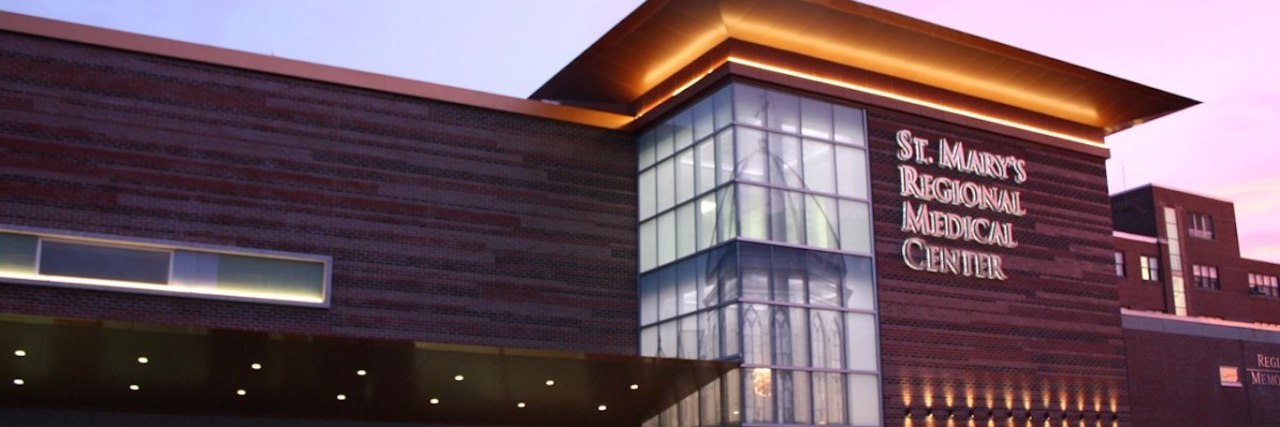Hospital Employees Used 'Wall of Shame to Humiliate Patients With Disabilities
A Maine hospital is in trouble after employees created a “wall of shame” aimed at mocking and humiliating patients with disabilities by posting their private medical data. After a former employee’s complaint, the Maine Human Rights Commission condemned the hospital’s actions.
MyKayla McCann began working as a laboratory technician assistant at St. Mary’s Regional Medical Center in Lewiston, Maine, in June 2015. She quickly discovered the “wall of shame” her new co-workers created inside a cabinet door at the hospital, according to Bangor Daily News (BDN).
An investigative report seen by BDN indicated the wall “included information detailing patients’ sexual activity, genital dysfunction, bowel movements, bodily odors and other personal maladies.” It also included identifying details such as dates of birth and diagnoses that were cut directly from their medical records, a violation of medical record privacy laws.
Discrimination against people with disabilities by members of the medical profession is not uncommon. People with disabilities often find doctor’s offices aren’t accessible — exam tables are too high or offices are too small. It’s more difficult for disabled patients to qualify for life-saving organ transplants. Studies show implicit bias and negative disability attitudes prevent patients from getting critical care, even in basic areas such as sexual health, mental health and lifestyle factors like diet, exercise and smoking.
“The statistics make a very compelling case that as … physicians, we need to overcome our subconscious perceptions and make sure we see every patient as a whole person, particularly when they are living with a disability,” Joshua Coren, D.O., said in a 2015 American Osteopathic Association news brief. “Disabled individuals have sex, use alcohol and drugs, over eat and under exercise like other populations, yet their doctors tend to avoid those topics.”
Initially, McCann didn’t say anything about the “wall of shame” for fear her own medical records would be added. McCann, who has a disability, was treated at St. Mary’s prior to being hired as an employee but transferred her medical care to other facilities. However, she soon realized some of her co-workers — three laboratory technicians in particular, according to BDN — began asking her inappropriate questions that indicated they had seen McCann’s personal medical records as well.
At this point, McCann went to her supervisor to report her colleagues had inappropriately accessed her personal medical records as well as the “wall of shame.” According to BDN, McCann said she reported this information in September 2016 but her supervisor doesn’t recall any mention of the incident until October 2016.
The supervisor did initiate an investigation based on McCann’s report but it took three or four months to conclude. It also took the hospital months to remove the “wall of shame.” According to BDN, one St. Mary’s employee was fired while another received a warning.
Despite the investigation and hospital’s actions, McCann still found the work atmosphere at St. Mary’s “intolerable” and quit in January 2017 before filing a complaint with the Maine Human Rights Commission. The commission investigates discrimination claims under the Maine Human Rights Act.
According to BDN, the commission recently concluded its investigation of McCann’s complaint and unanimously determined St Mary’s had discriminated against McCann by creating a “hostile environment.” Investigators also noted “an unacceptable delay” in the hospital’s investigation into McCann’s initial report.
“Coworkers constructed a workplace display ridiculing patients with disabilities,” the commission wrote in a statement, according to BDN, adding:
[McCann] encountered the display every day as part of her regular environment, making harassment pervasive. The information posted on Shame Wall was intended to demean and humiliate and included supposed ‘jokes’ about the hospital’s physically and mentally disabled patients. It was not treatment based. It was socializing. It was shaming. Even if it could be called hospital operations, which is a different standard, this is not the minimum necessary information to accomplish any legitimate goal.
In response to the commission’s report and backlash from the public, St. Mary’s Regional Medical Center’s parent company, Covenant Health, issued an apology, said it had taken appropriate actions and said it was committed to preventing such discrimination from happening again.
“We deeply regret that this situation occurred,” Covenant Health President/CEO Stephen Grubbs and St. Mary’s Health System President Steven Jorgenson said in a statement. “It is important to know that St. Mary’s Health System took immediate action to investigate and address Ms. McCann’s concerns, and took appropriate disciplinary action for others who were involved. We are fully committed to ensuring this doesn’t happen again.”
When pressed for more information by BDN on whether the hospital had informed other patients whose personal medical records were included in the “shame wall,” Karen Sullivan, vice president of corporate communications for Covenant Health, did not respond. Ezra Reinstein, founder of the Reinstein Law Firm in Framingham, Massachusetts, told BDN the hospital has a responsibility to inform its patients of privacy breaches, including one like this.
“It has to do pretty much anything it can. It can’t just get off the hook by saying it’s too hard to figure out,” Reinstein told BDN. “It’s absurdly offensive. It’s no way that a hospital should be operating anywhere in the country in this day and age — or any time. It’s horrendous.”
Results of the human rights commission’s discrimination investigation serve as the first step toward McCann either reaching a settlement with St. Mary’s or pursuing a lawsuit in court. BDN reported on Friday that McCann’s attorney, Verne Paradie, indicated McCann’s “claims have been fully resolved,” but Paradie did not provide additional details.
Header image via St. Mary’s Regional Medical Center Facebook page

